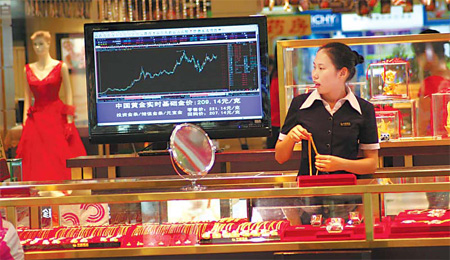China bats for bullion in uncertain times
|
|
|
A gold jewelry counter of a department store in Haikou, Hainan province. |
Gold might be a luxury most can live without when times are hard, but for cautious investors in China, the world's top producer and consumer of bullion, it has become a matter of necessity.
Jewelry sales might take a hit in China after gold prices topped $1,050 per ounce to mark a record high for the third session in a row yesterday, but amid ongoing economic uncertainty, many in the financial community still prefer bullion to bonds, analysts said in comments made before the record was struck.
The government itself - also looking for a safe haven for its foreign currency reserves - is likely to increase its gold holdings, which now officially stand at 1,054 metric tons.
"Consumption in China is expected to rise, as it is supported by expectations of inflation, and I also believe the government will increase its reserves," said Yao Haiqiao, president of Longgold Asset Management.
Only around 1.6 percent of China's foreign exchange reserves is held in gold, and that figure is expected to rise, Sun Zhaoxue, chairman of the China Gold Association, said earlier this year.
World gold prices have broken the $1,020 per ounce barrier for the first time since March 2008 as investors seek a safe haven from uncertainty about the world economy and the dollar. While some have warned the price might not be sustainable, Chinese buyers are still expected to remain active.
"Consumers are sensitive about the prices, so rising gold prices will definitely hit purchases in India and China. We have seen a rapid drop in India's jewelry consumption in the first half so a similar story could be happening in China," said Zoe Wang, analyst with Shanghai CIFCO Futures.
"But in terms of investment, purchases are rising, as more people are using gold as a hedging tool. Such purchases will obviously increase in China."
China is already the world's biggest gold producer, and in the first half of this year, consumption of the precious metal also became the highest in the world, overtaking India.
Albert Cheng, Far East managing director at the World Gold Council, said Chinese gold purchases for investment reached a record high of 70 metric tons in 2008.
With jewelry sales expected to fall - even in the biggest market of China, the only one to show any growth in 2008 -it is investment purchases that continue to drive up prices.
"The Chinese buy more gold bars in banks while Indians buy more jewelry," said Longgold's Yao.
Higher prices expected
While investors abroad warn $1,000 per ounce might not be sustainable, many in China are more confident. "Just because the price is high they will not suddenly start selling," said China Gold Association Vice-Chairman Hou Huimin. "There haven't been any big changes in behavior in China."
With demand still considerably higher than supply, there is room for more price increases, said Ellison Chu with Standard Bank in Hong Kong.
"We will see how this price level will affect the market but personally I think it can go higher. If the market gets used to this price level, I think it has the potential to move higher."
Longgold's Yao said China's gold investors had already climbed on the bandwagon and, in the absence of attractive alternatives, were reluctant to jump off.
"The herd mentality plays a big role in the Chinese investment market," said Yao. "I don't worry about rising gold prices hurting people because Chinese people pursue products whose prices are rising."
Further price support was likely to come from the Chinese government, which is expected to increase its gold reserves in the near future, Yao added.
Chinese investors have fought hard for the right to trade in new financial instruments and they are not likely to panic-sell their gold as a result of the price surge, Chu said.
"If you look at the stock market in the last few months, there has been volatility and rumors, and people are looking for something more stable. They can expect continuous growth in gold. I think it is a good way for them to invest."
Currency devaluations, dramatic cuts in interest rates and the threat of inflation have made gold one of the few attractions left in China.
 0
0 








Comments